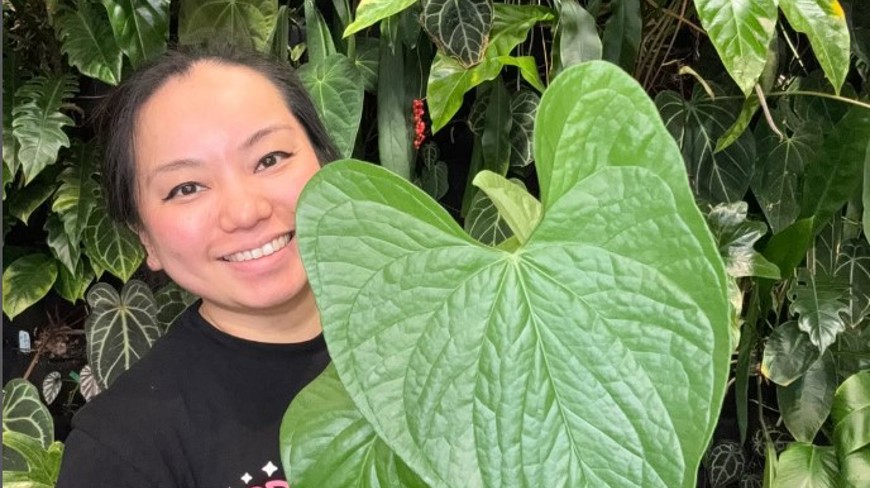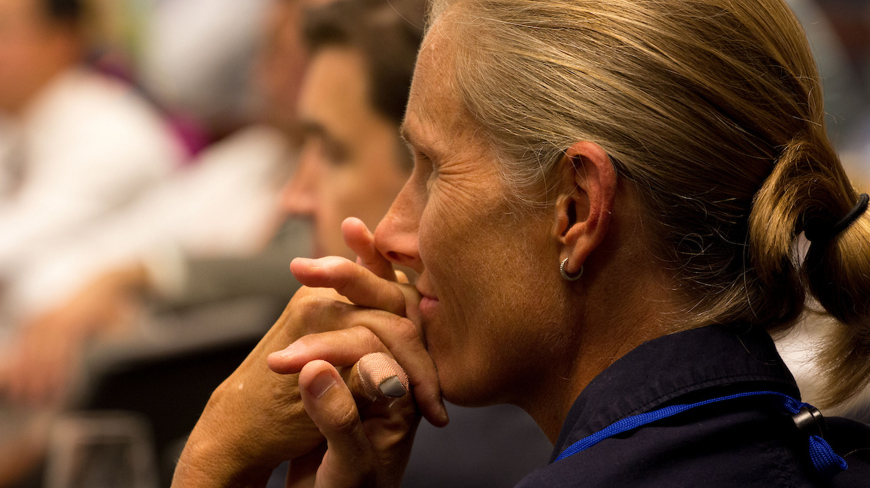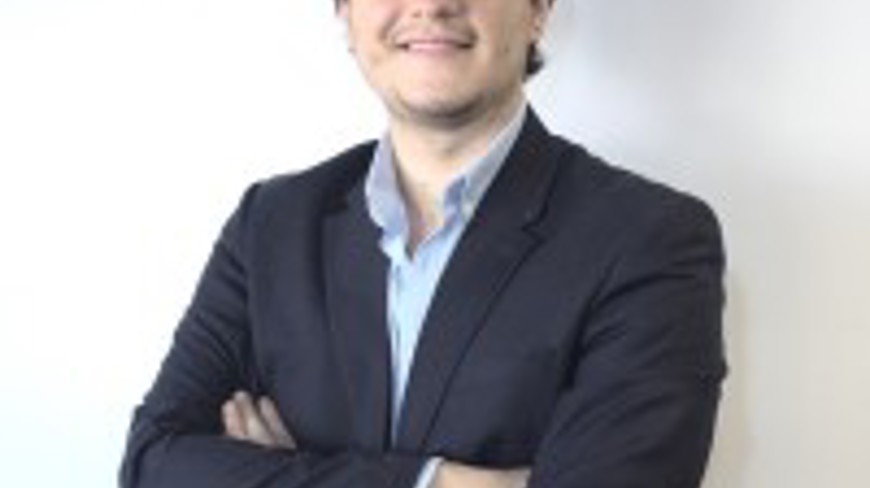Sole Purpose: Vince Lebon’s Journey to Footwear Fame in Australia
July 10, 2025
Published in:
How the EO Melbourne member navigated a reality competition and corporate growing pains en route to building his shoe company, Rollie Nation, into one of Australia’s boldest creative exports.

Vince Lebon still remembers the unmistakable bounce in his step and sense of pride after he first laced up his black-and-red Jordan 12 sneakers. The basketball-mad Melbourne teen and his brother wore matching pairs — rare luxuries gifted by their father, who had returned from a trip to the U.S. with those symbols of bigger dreams in tow. They were the same shoes Michael Jordan had worn in Game 5 of the 1997 NBA Finals, when he scored 38 points while battling illness — the now famous “Flu Game” — and had to be helped off the court by teammates after the crucial win. “We wore them everywhere,” Vince recalls now. “The connection with the shoes became bigger than the product itself.”
Those sneakers sparked more than just envy on local courts in Australia. They ignited in Vince a lifelong obsession with footwear, design, and the power of a compelling story. More than a decade later, and after spending years playing semi-professional basketball in Australia and working in the shoe industry, Vince would found Rollie Nation. The vibrant brand now has a global consumer base, 40 employees, and sits on the cusp of becoming one of Australia’s next great exports.
The path, though, from that first pair of Jordans to selling hundreds of thousands of Rollie Nation’s stylish, feather-light shoes has demanded not simply creative acumen or business savvy, but an unwavering self-belief. “Deep down, I've always had this feeling like I can achieve great things,” he says. “It was just about putting the pieces in place.”

Vince Lebon (EO Melbourne)
When Form Meets Function
Inspiration first struck in 2012: Vince’s wife, Kat (nicknamed “Rollie”) was a flight attendant who struggled to find fashionable shoes that were comfortable enough to wear during a job that kept her on her feet all day. Before launching Rollie Nation, Vince had already spent nearly a decade immersed in creative, branding, and marketing work in the shoe industry. That experience gave him a foothold, but creating his own label demanded he take a leap. “Launching your own brand is a little bit different to offering a service,” he says. “I did it on the side and was like, ‘As soon as it takes off, I’ll do this full time.’”
The business did not idle on the launching pad. Around the time he launched Rollie Nation, Vince had just accepted a day job with a footwear firm, though he was fully transparent about his ambitions for his own shoe label. Only two weeks later, impressed by his vision, his new employers offered to back him as partners. “Everything just unfolded very, very quickly,” he says, as Rollie Nation quickly attracted interest from wholesalers and, eventually, built an online retail business.

“The connection with the shoes became bigger than the product itself.”
- Vince Lebon (EO Melboune)
In 2017, Vince took part in a U.S.-based design competition and, later, a related YouTube reality show called “Lace Up: The Ultimate Sneaker Challenge” where contestants designed custom sneakers for celebrities and NBA players such as 2018 MVP James Harden. Through eight weeks of breakneck design deadlines and high-stakes presentations, Vince thrived. “If ever I need to lock into that energy, I know it’s there,” he says. “I’ve done it before.”
Vince returned to Rollie Nation with a renewed sense of purpose and urgency, but it also reaffirmed a lesson from his youth: Design is most powerful when it’s tethered to narrative. “Being connected to story allows you to evolve emotional connection beyond product,” he said. “I recognized that very early.”
Still, Vince’s early success didn’t spare him from some of entrepreneurship’s tensions and complexities. Understanding organizational governance and working with board members soon demanded more than diligence and a keen sense of style. He had to endure a grueling, year-and-a-half-long renegotiation of an early shareholder agreement that, in hindsight, he realized was unfair and unfavorable. Rather than enlisting a legal team, he enrolled in a corporate governance course so that he could better navigate the intricate dynamics between board members, shareholders, and executives.
A decade into the business, the partners who helped fund the company at its outset had already garnered a 27x return on their investment, so Vince stood firm in negotiating for a more favorable arrangement that better reflected his contributions. “I want to be very clear,” he told his partners. “If you want the remaining future growth, this is what it must look like.”
Highlights from Vince's appearance on the "Lace Up" YouTube competition series.

Culture First
Today, Rollie Nation operates two brick-and-mortar stores and continues to grow its direct-to-consumer online presence, especially in Australia and New Zealand. While Vince once balanced wholesale and online sales to build the company, he now sees the retail stores as a crucial missing element. “I felt like we needed a flagship store to better articulate the (direct to consumer) experience properly and to have more control over how the brand looks,” he says.
The company’s growth hasn’t been without turbulence. When he moved to the U.S. for the reality competition and a resultant Adidas design contract, he hired a general manager to oversee day-to-day operations in Melbourne. The fit was wrong. Values diverged. Processes faltered. “I didn’t have anything documented at that time,” Vince says. “So, whenever he hired someone, it was based on his value set, not mine.”
That misstep triggered a shift when he returned to Australia. Vince revamped the onboarding, training, and evaluation processes, and began hardwiring company values into each. Structure, he realized, is not a constraint on creativity — but its enabler.
In 2023, to aid in those efforts, Vince joined Entrepreneurs’ Organization (EO), a global network of successful founders and business owners. For a self-described introvert who thrives amid deep work and introspection, EO has proven to be a sanctuary. The connections he’s formed in his Forum — a small group where members discuss personal and professional challenges with candor — have expanded his thinking and helped him stay centered. “We have some people with really good (emotional intelligence) and others who are super capable,” he says. “It’s the diversity of thought and being exposed to people’s perspectives on a particular challenge that I find really interesting.”
 Rollie Nation specializes in lightweight, comfortable shoes across an array of styles.
Rollie Nation specializes in lightweight, comfortable shoes across an array of styles.
With a dedicated consumer base and a growing reach, Rollie Nation is a success by any traditional measure. Resultantly, Vince has wrestled with the push-and-pull of contentment and ambition. Can he be happy with all he has accomplished? Or should he keep seeking more?
After quiet introspection, he feels drawn to the latter: He wants to build a global brand that becomes a symbol of Australian culture and style, akin to what On, a popular running shoe company, has done for Switzerland. To get there, he knows selling a compelling story is just as important as designing a stellar product, a notion he has clung to since he first laced up that treasured pair of Jordans.
“I am invigorated by the idea of having no limits to my creativity,” he says. “I believe in it.”
 More Entrepreneurial Journeys
More Entrepreneurial Journeys

How Jocelyn Ho Turned a Pandemic Hobby into an Exotic Plant Powerhouse
EO Detroit’s Jocelyn Ho transformed an apartment full of rare tropical plants into a thriving retail business and found her purpose as a pioneering business owner.

Before You Exit: What I Wish Someone Had Told Me About Life After the Deal
When EO member Steven Kapor sold his business after launching a groundbreaking new software product, he wasn’t prepared for the personal and professional challenges that followed. His story highlights why entrepreneurs must plan for life after exit—and how EO helped him through the toughest chapter.

From Runner-Up to Revenue: Rodrigo Maselli’s EO Journey
After finishing second in EO Guatemala’s GSEA competition, Rodrigo Maselli used the prize check as motivation—not currency—while building his agency through EO Accelerator.
